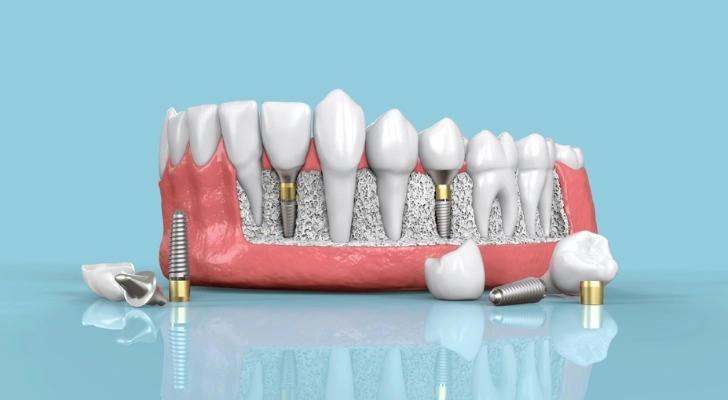A Comprehensive Guide to Dental Implants

What Are Dental Implants?
Dental implants are a modern solution for replacing missing teeth, restoring both function and appearance. An implant consists of a small titanium post that is surgically placed into the jawbone. Over time, this post bonds with the surrounding bone, creating a solid base for a replacement tooth. This replacement is usually a crown, but implants can also support bridges or dentures.
Implants provide a long-lasting solution for tooth loss. Unlike removable dentures, which can shift or feel uncomfortable, or dental bridges, which require altering nearby healthy teeth, implants stand alone and blend seamlessly with your natural teeth. This makes them a great choice for many people looking to restore their smiles and bite.
When Are Dental Implants Needed?

Dental implants are especially useful in several situations:
•Replacing Missing Teeth: Implants are ideal for people who have lost teeth due to decay, injury, or other reasons. They offer a permanent solution that looks and functions like natural teeth.
•Maintaining Oral Health: When a tooth is missing, the jawbone underneath can start to weaken over time. Implants help keep the bone healthy by providing the necessary stimulation during chewing, which can prevent bone loss and support overall dental health.
•Improving Quality of Life: For those who have had trouble with removable dentures, implants provide a more stable and comfortable option. They eliminate the need for messy adhesives and reduce the risk of slipping, making chewing and speaking more natural.
Advantages and Risks of Dental Implants

Advantages:
1.Natural Appearance and Function: Implants are designed to closely resemble natural teeth in both look and feel. They are customized to match the color, shape, and size of your existing teeth, resulting in a seamless blend with your smile. The success rate for implants is impressively high, around 95% after ten years of use.
2.Durability: Implants are made from titanium, a strong material that can last many years. They are built to withstand the everyday pressures of chewing and biting, making them a reliable long-term solution.
3.Bone Preservation: One major benefit of dental implants is their ability to maintain jawbone density. When a tooth is lost, the jawbone can weaken. Implants stimulate the bone and help prevent this loss, keeping your jaw healthy and your facial appearance intact.
4.Enhanced Functionality: Implants offer a fixed and stable solution for missing teeth, improving chewing efficiency and speech clarity. This stability enhances overall comfort and confidence compared to traditional dentures or bridges.
Risks:
1.Surgical Risks: Like any surgery, dental implant placement has some risks. Possible complications include infection at the implant site, bleeding, or reactions to anesthesia. However, these risks are generally low and can be managed with proper care.
2.Post-Operative Discomfort: After the procedure, some patients may experience temporary discomfort such as pain, swelling, or bruising. These symptoms are usually mild and can be relieved with pain medication and proper care.
Patient Cases
Case 1: Ms. Wang
Ms. Wang, a 40-year-old professional, lost her lower front teeth due to severe decay. She initially struggled with removable dentures, which felt uncomfortable and unstable. After consulting her dentist, she chose dental implants despite the higher cost, partially covered by her insurance. Ms. Wang was thrilled with the outcome, noting significant improvements in her smile and her ability to eat and speak comfortably.
Case 2: Mr. Li
Mr. Li lost several back teeth in an accident. Unfortunately, he didn’t have enough jawbone to support immediate implant placement. His dentist recommended a bone graft procedure to build up the bone before placing the implants. While this added time and cost, Mr. Li was satisfied with the final results, as the implants provided him with renewed function and comfort.
Specific Solutions
1.Post-Operative Care:
•Oral Hygiene: Keeping the implant site clean is crucial for success. Use a soft toothbrush, fluoride toothpaste, and an antibacterial mouthwash to maintain cleanliness and prevent infection. Regular flossing and rinsing with an antimicrobial solution can also help keep your gums and surrounding bone healthy.
•Follow-Up Visits: Regular check-ups with your dentist are essential for monitoring the health of your implants. These visits allow your dentist to assess progress and address any issues early, ensuring the long-term success of your implants.
•Dietary Adjustments: Right after surgery, it’s best to avoid hard or sticky foods. Start with softer options and gradually reintroduce more solid foods as your mouth heals.
2.Cost Management:
•Understanding Costs: Dental implants can be a significant investment. It’s important to understand all potential costs, including any extra procedures like bone grafting. Discuss these details with your dentist to avoid unexpected expenses.
•Financing Options: Many dental practices offer flexible payment plans or financing options to help manage the cost of implants. Talk to your dental office about these options and check with your insurance provider to see what coverage may be available.
3.Addressing Jawbone Density Issues:
•Bone Grafting: If your jawbone lacks sufficient density for implant placement, a bone graft may be necessary. This procedure involves adding bone material to the jawbone to create a stable base for the implant. While this may add time and cost, it’s a common and effective solution to ensure successful implant placement.
Clinical Data and Research
•Success Rates: Dental implants have a high success rate, around 98%, when placed in healthy bone and cared for properly. This high rate highlights their effectiveness as a long-term solution for tooth replacement.
•Bone Preservation: Studies show that dental implants are better than traditional dentures at preserving jawbone density. This preservation is crucial for maintaining the jaw’s structure and overall oral health.

In summary, dental implants offer an effective and appealing solution for missing teeth. By understanding their benefits, risks, and associated costs, you can make an informed decision about whether implants are right for you. With proper care and regular dental visits, implants can provide a lasting solution for restoring your smile and oral function.
